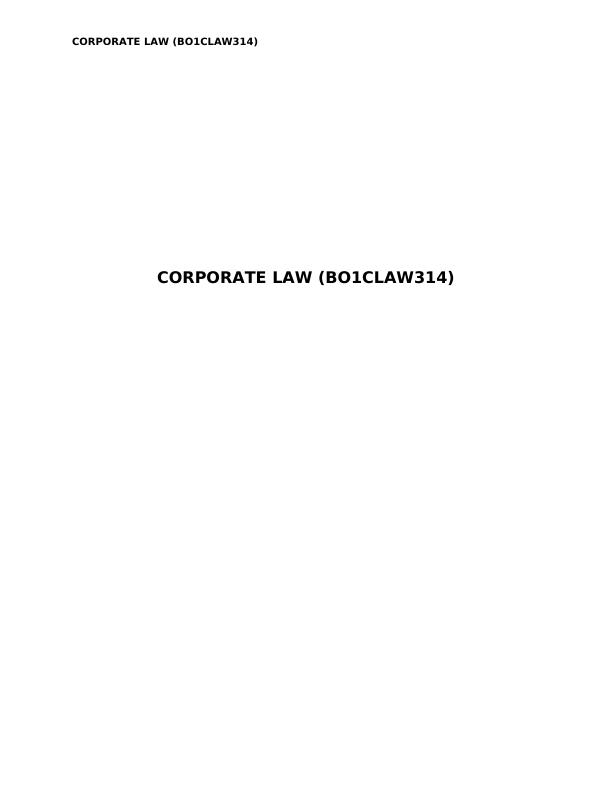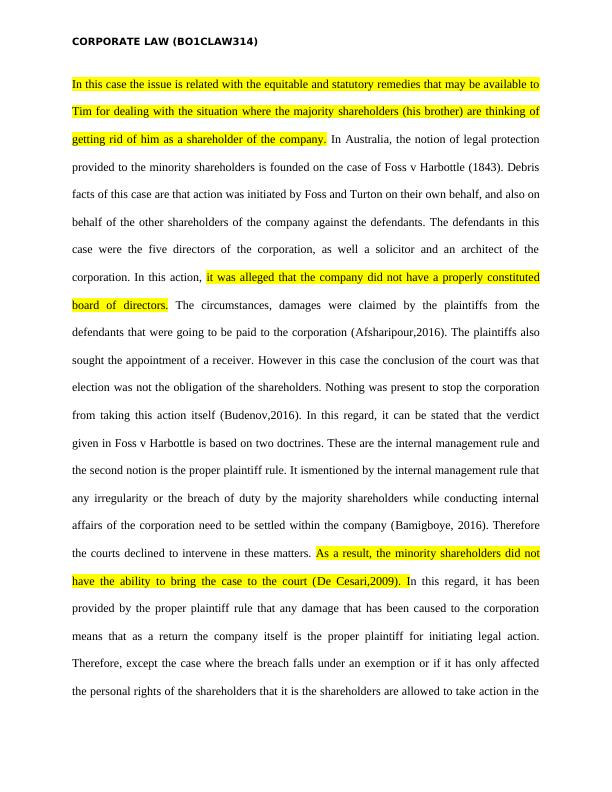Equitable and Statutory Remedies for Minority Shareholders in Corporate Law
Added on 2023-01-11
10 Pages2863 Words76 Views
CORPORATE LAW (BO1CLAW314)
CORPORATE LAW (BO1CLAW314)
CORPORATE LAW (BO1CLAW314)

CORPORATE LAW (BO1CLAW314)
In this case the issue is related with the equitable and statutory remedies that may be available to
Tim for dealing with the situation where the majority shareholders (his brother) are thinking of
getting rid of him as a shareholder of the company. In Australia, the notion of legal protection
provided to the minority shareholders is founded on the case of Foss v Harbottle (1843). Debris
facts of this case are that action was initiated by Foss and Turton on their own behalf, and also on
behalf of the other shareholders of the company against the defendants. The defendants in this
case were the five directors of the corporation, as well a solicitor and an architect of the
corporation. In this action, it was alleged that the company did not have a properly constituted
board of directors. The circumstances, damages were claimed by the plaintiffs from the
defendants that were going to be paid to the corporation (Afsharipour,2016). The plaintiffs also
sought the appointment of a receiver. However in this case the conclusion of the court was that
election was not the obligation of the shareholders. Nothing was present to stop the corporation
from taking this action itself (Budenov,2016). In this regard, it can be stated that the verdict
given in Foss v Harbottle is based on two doctrines. These are the internal management rule and
the second notion is the proper plaintiff rule. It ismentioned by the internal management rule that
any irregularity or the breach of duty by the majority shareholders while conducting internal
affairs of the corporation need to be settled within the company (Bamigboye, 2016). Therefore
the courts declined to intervene in these matters. As a result, the minority shareholders did not
have the ability to bring the case to the court (De Cesari,2009). In this regard, it has been
provided by the proper plaintiff rule that any damage that has been caused to the corporation
means that as a return the company itself is the proper plaintiff for initiating legal action.
Therefore, except the case where the breach falls under an exemption or if it has only affected
the personal rights of the shareholders that it is the shareholders are allowed to take action in the
In this case the issue is related with the equitable and statutory remedies that may be available to
Tim for dealing with the situation where the majority shareholders (his brother) are thinking of
getting rid of him as a shareholder of the company. In Australia, the notion of legal protection
provided to the minority shareholders is founded on the case of Foss v Harbottle (1843). Debris
facts of this case are that action was initiated by Foss and Turton on their own behalf, and also on
behalf of the other shareholders of the company against the defendants. The defendants in this
case were the five directors of the corporation, as well a solicitor and an architect of the
corporation. In this action, it was alleged that the company did not have a properly constituted
board of directors. The circumstances, damages were claimed by the plaintiffs from the
defendants that were going to be paid to the corporation (Afsharipour,2016). The plaintiffs also
sought the appointment of a receiver. However in this case the conclusion of the court was that
election was not the obligation of the shareholders. Nothing was present to stop the corporation
from taking this action itself (Budenov,2016). In this regard, it can be stated that the verdict
given in Foss v Harbottle is based on two doctrines. These are the internal management rule and
the second notion is the proper plaintiff rule. It ismentioned by the internal management rule that
any irregularity or the breach of duty by the majority shareholders while conducting internal
affairs of the corporation need to be settled within the company (Bamigboye, 2016). Therefore
the courts declined to intervene in these matters. As a result, the minority shareholders did not
have the ability to bring the case to the court (De Cesari,2009). In this regard, it has been
provided by the proper plaintiff rule that any damage that has been caused to the corporation
means that as a return the company itself is the proper plaintiff for initiating legal action.
Therefore, except the case where the breach falls under an exemption or if it has only affected
the personal rights of the shareholders that it is the shareholders are allowed to take action in the

CORPORATE LAW (BO1CLAW314)
court (Girgis,2018). Otherwise the company will be the proper plaintiff. Therefore it is clear that
the canon provided in Foss v Harbottle is in favor of the directors who are also the majority
shareholders of the corporation. However as a remedy, certain exceptions under the statutory law
and common law have been developed to this rule by the courts (McFarland,2011).
Exceptions under the common law: In case of circumstances mentioned below, legal action can
be taken against the management of a corporation.Illegal or Ultra Vires: the law provides that if
the management of the corporation has acted or is going to act illegally, against the powers
granted to the corporation, an ability had headed to the shareholders of the corporation to take
court action against the management (McFarland,2011). This provides an exception to the
limitation imposed by the proper plaintiff rule (Salim and Lawton, 2008). Moreover, such cases
cannot be ratified by the GMS.
Special majority: in case the written law of the company (or corporations’ law) needs that a
special majority resolution should be passed in the GMS for solving a method where there has
been an abuse of the rights of the shareholders and this majority is not fulfilled, then the
shareholders are allowed to seek relief from the courts. This necessary prerequisite in case of
special majority amounts to more than simple majority (Kang,2011).Personal rights of the
members: in case there has been anviolation of the personal rights of the minority shareholders,
there is an exception available to the rule provided in Foss v Harbottle. In this context, the
personal rights of the shareholders can be described as the particular individual rights that are
available due to the shares held by the shareholder or on account of other legal contracts
(Koh,2015).
Fraud on minority: there is exclusion present to the canon of Foss v Harbottle. This exception is
available when the act of the majority shareholders of the corporation causes an unexpected
court (Girgis,2018). Otherwise the company will be the proper plaintiff. Therefore it is clear that
the canon provided in Foss v Harbottle is in favor of the directors who are also the majority
shareholders of the corporation. However as a remedy, certain exceptions under the statutory law
and common law have been developed to this rule by the courts (McFarland,2011).
Exceptions under the common law: In case of circumstances mentioned below, legal action can
be taken against the management of a corporation.Illegal or Ultra Vires: the law provides that if
the management of the corporation has acted or is going to act illegally, against the powers
granted to the corporation, an ability had headed to the shareholders of the corporation to take
court action against the management (McFarland,2011). This provides an exception to the
limitation imposed by the proper plaintiff rule (Salim and Lawton, 2008). Moreover, such cases
cannot be ratified by the GMS.
Special majority: in case the written law of the company (or corporations’ law) needs that a
special majority resolution should be passed in the GMS for solving a method where there has
been an abuse of the rights of the shareholders and this majority is not fulfilled, then the
shareholders are allowed to seek relief from the courts. This necessary prerequisite in case of
special majority amounts to more than simple majority (Kang,2011).Personal rights of the
members: in case there has been anviolation of the personal rights of the minority shareholders,
there is an exception available to the rule provided in Foss v Harbottle. In this context, the
personal rights of the shareholders can be described as the particular individual rights that are
available due to the shares held by the shareholder or on account of other legal contracts
(Koh,2015).
Fraud on minority: there is exclusion present to the canon of Foss v Harbottle. This exception is
available when the act of the majority shareholders of the corporation causes an unexpected

End of preview
Want to access all the pages? Upload your documents or become a member.
Related Documents
Equitable and Statutory Remedies for Minority Oppressionlg...
|10
|2864
|1
Report on Critically Discussing - Companies Act 2006lg...
|15
|4747
|66
Sam and Kate are the directors and shareholders of Fantasticlg...
|10
|2979
|180
Minority Shareholders Oppression: Protection and Remedieslg...
|8
|2226
|425
Company Law Assignment | Commercial & Corporation Actlg...
|9
|2084
|279
Business Law Case Study: Analysis of Violations of Corporations Act 2001 (Cth)lg...
|11
|2296
|440
